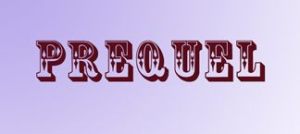Publishing is competitive.
It takes a number of different approaches and some long-range planning for any author, regardless of talent, to carve out a thriving career. The right prequel could make a huge difference in that plan, or it could spell disaster.
But how do you know if a prequel is right for you?
If you’re standing at the crossroads in the great prequel debate, keep reading!
[important]What is a prequel? A prequel is a story that precedes an existing published work. A prequel can be of any page length, however many are short stories.[/important]
Currently writing blogs are divided on the prequel. Some feel like it’s been done to death and should be avoided at all cost, others say go for it. I think it depends on the project.
There are several paths that lead a writer to embark on the prequel journey, but I think some of the best reasons are:
- A prequel can enhance the enjoyment of the current readers by answering nagging questions.
- It can expand the world building, flesh out secondary storylines or give the origin story of popular characters without bogging down the plot of the main storyline.
- It shortens the reader’s wait time and helps bridge the gap between full length book projects.
- And one of the most popular reasons (and perhaps why the prequel has a bit of a bad reputation right now), the writer can use the prequel exclusively for marketing purposes.
The next important question to ask is will the prequel stand alone, or work as a supplement to the existing stories? My view is all prequels should be able to stand alone, but some writers might disagree. So if you’re having trouble deciding, go back up to the top of this post and reconsider your reasons for writing a prequel. Ask yourself: do you want something just for your current readers vs. do you want something to help build new readers? If you’re in the enviable place of not needing to bring in any new readers, by all means create a prequel that will not stand alone.
Next, how do you create a top quality prequel?
- Do make the prequel the best writing you can offer. This is not the place to shortcut the editing process and crank out a fast slipshod short story.
- Do have a plot with a clear story and/or character arc. If the prequel story ends where another book starts, make sure the prequel’s plot supplements the next story in an exciting way.
- Don’t contradict yourself. Make sure the prequel never breaks or bends the laws of the current world building.
- Don’t use a prequel as a place to dump all the bits and pieces you cut from early books. I see the appeal of doing this, you may have a TON of extra world building data. Remember you chopped that content for a reason. Let the data dump stay right where it should, in the recycle bin.
- Do remember a prequel is not about recycling old bad writing; it’s about upcyling great research and creative world building into a new project.
- Do come at your main storyline from a new angle. Feature an unexpected character in the prequel. Maybe show us why your antagonist is the raging S.O.B. we all love to hate.

My goodness! This was EXACTLY what I needed. Although I just finished my second novel and should be focusing all my time on marketing it, my under-promoted novel from 2014 has been screaming at me to put some real action behind it also. I wrote it with at least three more books in mind as a series, but after the disillusionment about getting instant success subsided, I had to deal with the “first book marketing” blues. It took a while to recover fully, but after writing a number of small non-fiction ebooks, I know the drill; or so I thought. Now that “Skipping Childhood” (second novel) is done, I felt myself starting feel all the same old marketing anxieties. Anyway – long story short, I thin a prequel will be great for the first book for several of the above mentioned reasons. Now I’m convinced, after coming across this article. THANKS
You’re very welcome!